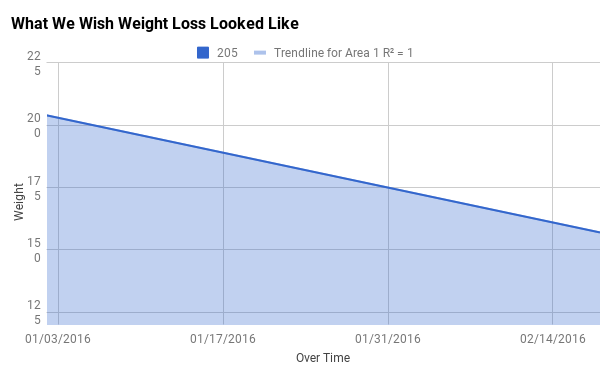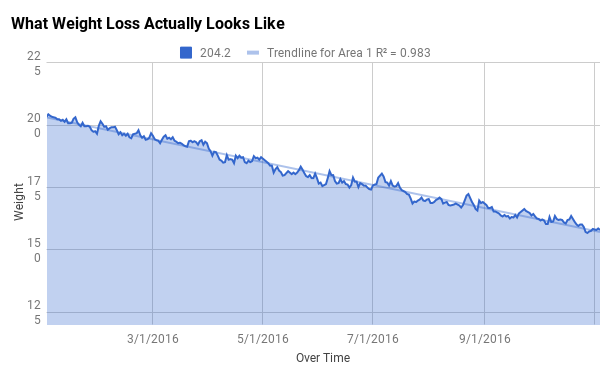If I could pick one single thing that I would want anyone embarking on a weight loss journey to understand, it would be that weight loss is like a heartbeat. Your daily weight will go up and down and up and down, even when you’re doing everything right. We all wish this were not true. We want the weight loss journey to look like this:

That’s at least what I wanted. I really wanted to lose a pound a day. And I wanted it to be a straight line down. I didn’t want to have any “up days” on the scale. In the beginning, I thought that any time the scale went up, that meant I had failed the day before. Any time the scale went down, I had done the right thing. This was wrong, and if I had kept thinking this way, I’d probably still be obese.
Luckily, I came across an article that changed my thinking. It suggested averaging your weight, so that you didn’t get thrown off by daily fluctuations. This was a major game-changer.
What do daily fluctuations look like? Well, everyone is different, but here’s what my numbers looked like in 2016:

I ran the numbers on my weight tracking spreadsheet. 4 times out of ten, when I stepped on the scale that year, my number was higher than it was the day before. If I had only been paying attention to that daily number, I would have given up. I would have also drawn completely inaccurate conclusions. There were days where I overate, but then the next day, the number was lower. There were other times where I ate just the right amount, and my weight went up.
How much did it go up? On average, right at a pound, though my highest jump in a day was 4 pounds. That graph doesn’t really convey how it can feel to see the number on the scale go higher the next day, even though you’re doing everything right. Or, in my case, doing everything as best as I could, but still unintentionally overeating or stress eating at times. Despite my imperfection, I was doing “good enough” so that I could lose almost 50 pounds that year. Generally, I was being consistent with my plan. And yet 40% of the time, my daily weight was higher than the day it was before.
When you’re looking at this graph, you know the happy ending. You can see that I lost weight successfully. But when you’re on your own weight loss journey, you don’t know the end. And so the daily number can feel a lot more important. It can feel like an “up day” means you’re on the wrong track. This simply ain’t so.
In the end, what helped me was to understand that this was a mental game. I decided to be more stubborn than the scale and to believe that over time, as long as I kept going, I would lose the weight. To do so, I had to detach emotionally from the scale and keep plugging away, day in, day out, no matter what the number on the scale said that morning.
The main lesson I learned? The daily numbers aren’t so important. You almost have to ignore them. But not completely. It’s kinda like this. Weigh daily. Keep track of those numbers. Always be honest with yourself about whether you’re sticking to your plan, and especially whether or not you’re overeating, and try to do better in the future. Pay special attention to how the numbers are trending over a 6-week period.
Why 6 weeks? Why not 4? Why not 7? Well, I can only speak from my experience. In my experience, the 6-week look back always confirmed that the scale was moving down and kept me on the right track. Looking at trends shorter than that would have led me to make changes that would have been unnecessary. If the numbers are trending up consistently, it means you’re eating too much. But if the numbers are trending down, you can give yourself the thumbs up and continue on your journey, despite the scale being “up” almost half the time.
To put it another way, the single-day weight is important only in the sense that it’s important to track your weight, and the best way to do that is to get in the habit of weighing every day, so you don’t even need to think about it. The seven-day average is helpful because it keeps you focused on a week’s worth of effort and it evens the numbers out a bit. But lifting your horizon even further, to how your 7-day average is trending over 6-weeks of time keeps you focused on the long-term. It also helps you resist the temptation to do unsustainable things because you’ll start asking yourself, can I really stick with that proposed change for 6 whole weeks? You’ll automatically switch your focus to where it needs to be: permanent lifestyle change.
So if you’re about to embark on a weight loss journey, or if you’re in the thick of it, remember: weight loss is like a heartbeat. Keep tracking, keep implementing your plan, and keep an eye on the numbers, but don’t let them get you off track.
